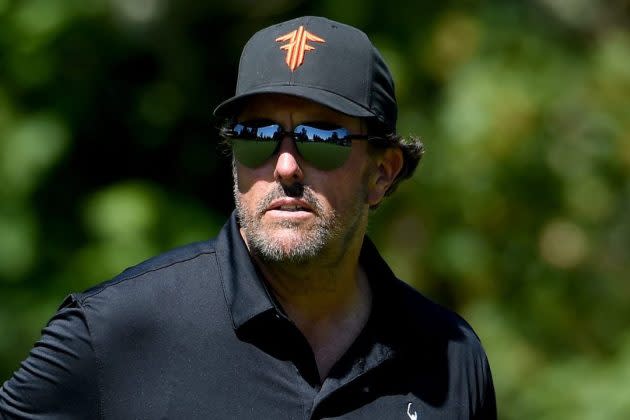
After months of speculation that golfers punished by the PGA Tour for joining LIV Golf would pursue antitrust litigation, Phil Mickelson and 10 other golfers sued the tour on Monday for alleged antitrust violations. The 105-page complaint, filed in a San Francisco federal court, demands an injunction that would enjoin the tour from expelling, suspending or otherwise punishing golfers from playing on the Saudi-backed LIV or from conspiring with the European Tour and other groups to limit golfers’ professional opportunities.
The complaint, which was signed by attorney Rachel Brass of Gibson Dunn & Crutcher on behalf of herself and other attorneys, contains legal arguments previously discussed on Sportico as likely. The gist of the case is that, as the plaintiffs see it, the tour is behaving as an illegal monopsony. A monopsony is similar to a monopoly, except it refers to a buyer of services—in this instance, the play of elite professional golfers. The tour is alleged to have too much control over where golfers can sell their services and that (allegedly) excessive control harms economic competition.
More from Sportico.com
Brass, an accomplished antitrust expert, asserts the tour “has employed its dominance to craft an arsenal of anticompetitive restraints.” Those purported membership rules allow the tour to reject golfers’ requests to play in other leagues and limit their autonomy in profiting from media rights.
Brass portrays the tour as vindictive. “The Tour,” she says, “has repeatedly threatened its members with devastating consequences if they join LIV Golf.” Brass goes on to discuss the tour imposing “career-threatening bans” on Mickelson and other golfers for playing in LIV events. She also accuses of “orchestrating a group boycott” with the European Tour to “ensure that any golfer who considers defying the Tour’s threats by playing in any LIV Golf events (including Plaintiffs) cannot pursue his career and livelihood anywhere in the global golf ecosystem.”
Tour commissioner Jay Monahan is also targeted for rebuke throughout the complaint. At one point he is described as purposefully inconsistent in when he has allowed golfers to compete in other tournaments. “As Commissioner Monahan has confessed,” Brass writes, “he has departed from past practice in prohibiting members from participating in LIV Golf events outside North America because LIV Golf plans to compete with the Tour.”
Consumers are no better off, Brass further contends, with tour rules that restrict competition. Those rules serve to prevent golfers from playing in more tournaments. She maintains that if the tour is allowed to “unlawfully maintain” its market dominance, “players, consumers, and other stakeholders will be harmed.”
Restraining orders are ordinarily difficult to obtain. The golfers must establish, among other points, that they would suffer irreparable harm, meaning a harm that cannot be later remedied—including by monetary damages. Brass contends there is irreparable harm in the form of being denied the chance to compete in events that won’t be replayed and gain from professional opportunities that come along with competing. She also contends young golfers suffer developmental harm in that they can’t play in tournaments where they could grow as players.
In addition to a restraining order, the golfers seek a jury trial where monetary damages could be awarded. Those damages would reflect alleged harm from the loss of FedEx Cup ranking points, loss of OWGR ranking points, loss of career opportunities, loss of goodwill, loss of reputational harm, loss of income-earning opportunities and loss of retirement-plan payments.
A complaint is only one side of a story. In forthcoming court filings, the tour will offer its own set of arguments. Expect it to argue that just like membership in any organization, membership in the tour carries responsibilities and conditions. The tour will contend golfers have the choice to play for the league they wish, and it is not illegal to make them decide. From that lens, golfers aren’t “harmed” by the tour as much as they are harmed by having to decide. The tour will also likely insist that golf fans and TV viewers enjoy the tour’s system, which has made the sport highly popular, and that a court interfering with the tour could undermine consumer interest.
The other golfers in the case are Talor Gooch, Hudson Swafford, Matt Jones, Bryson DeChambeau, Abraham Ancer, Carlos Ortiz, Ian Poulter, Pat Perez, Peter Uihlein and Jason Kokrak, who recently lost an endorsement deal with a law firm on account of joining LIV.
Mickelson v. PGA Tour comes on the heels of the Justice Department launching a probe into potential antitrust problems with LIV.
As of this writing, the case has not yet been assigned to a judge.
Best of Sportico.com
Click here to read the full article.